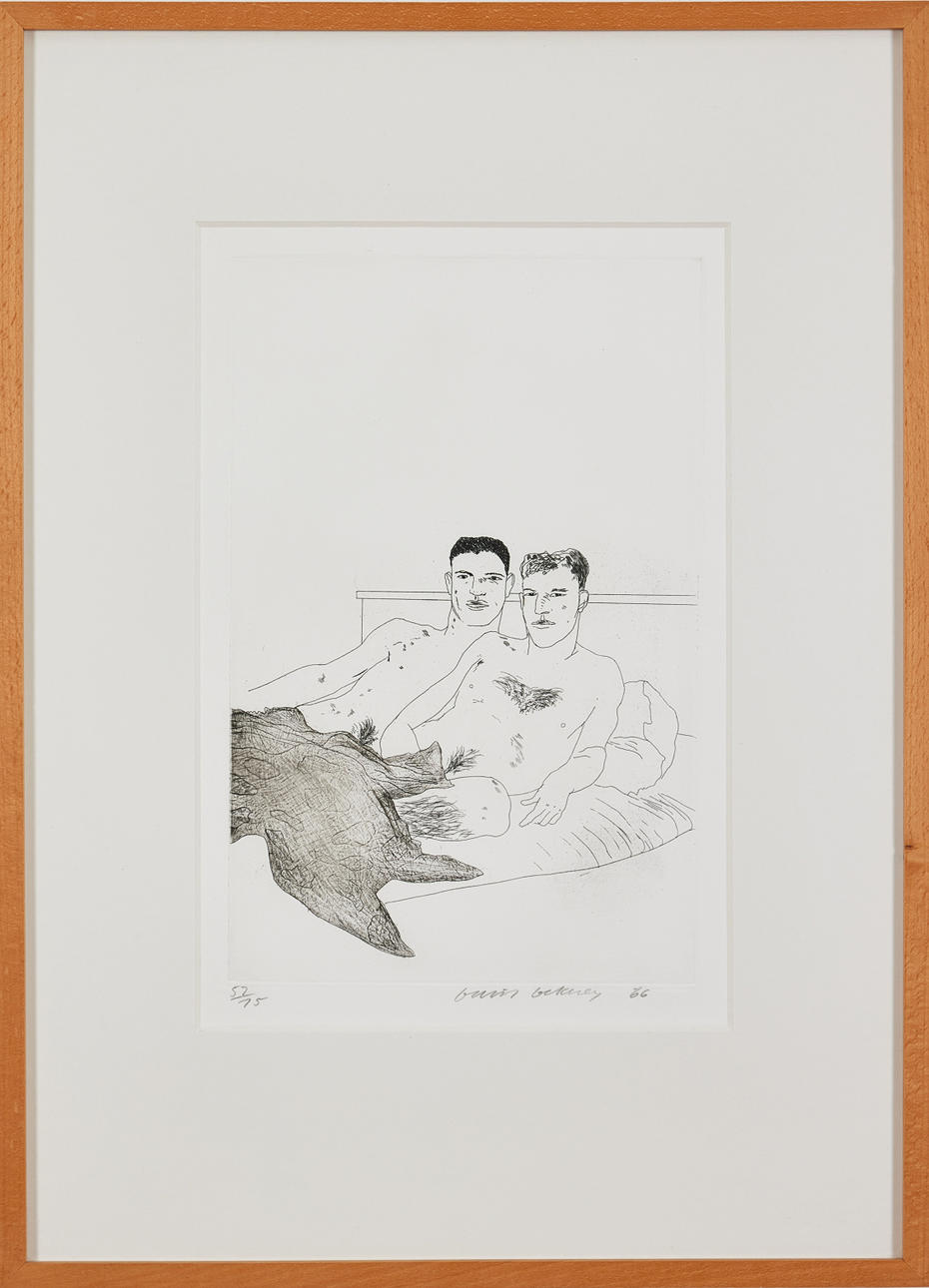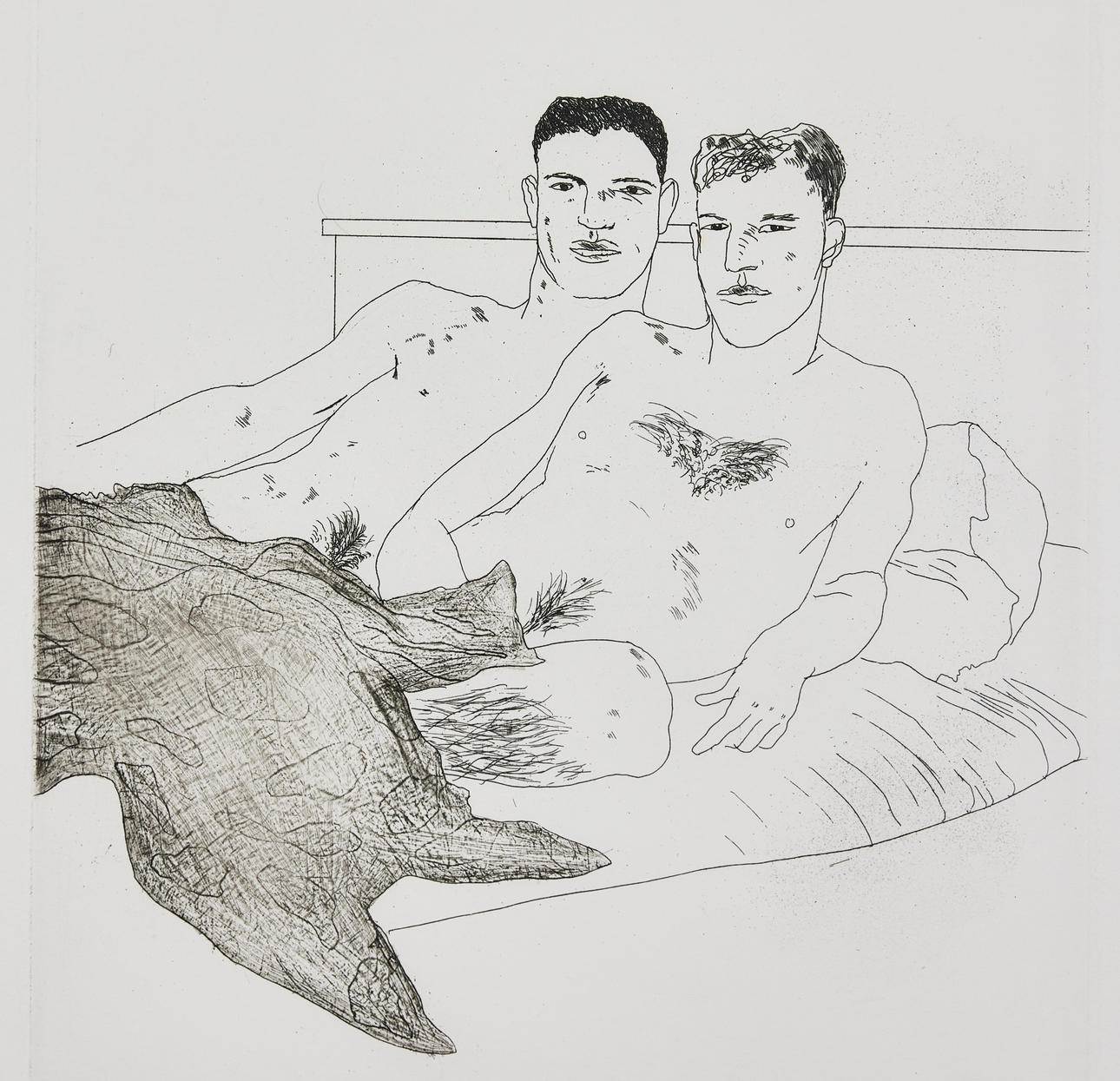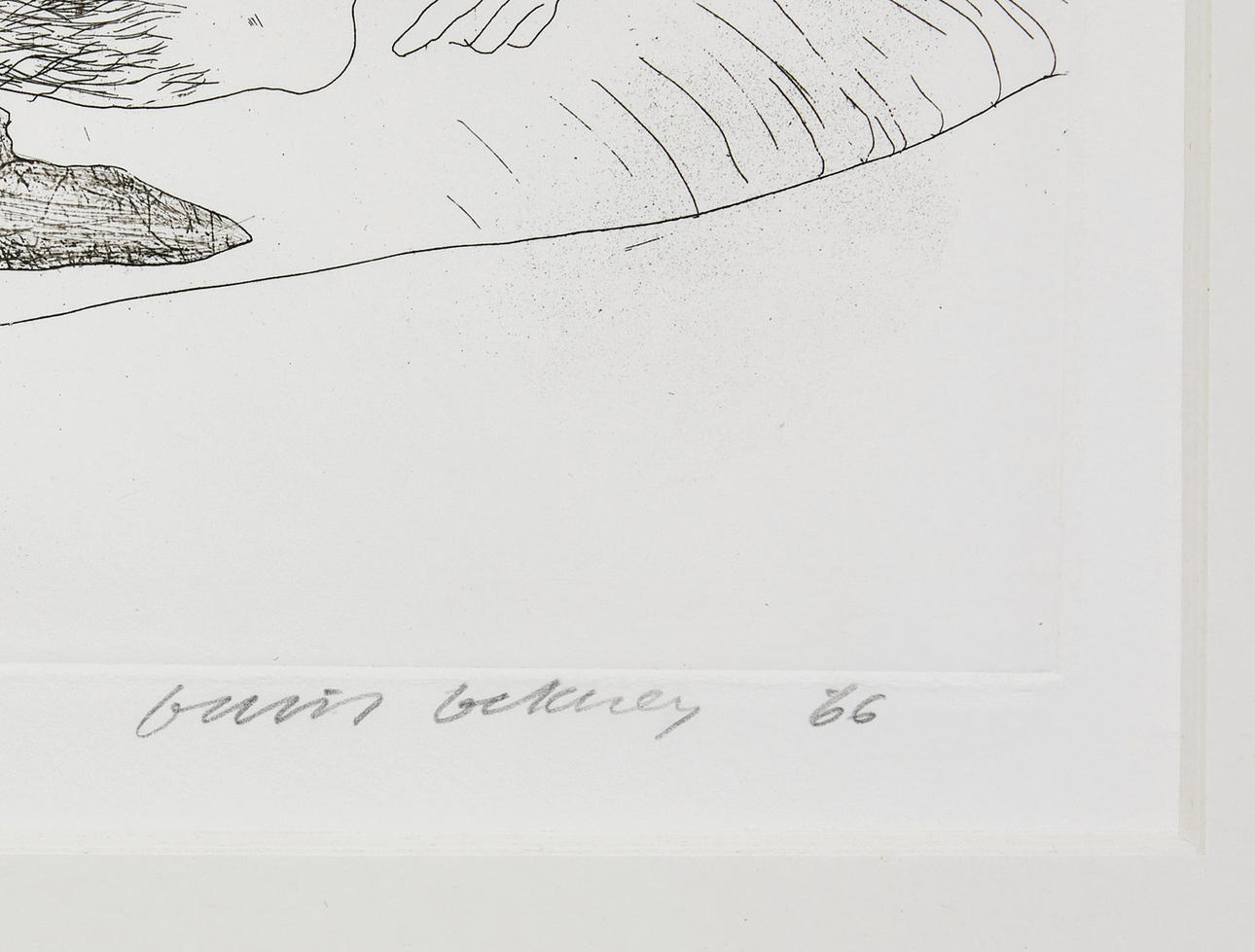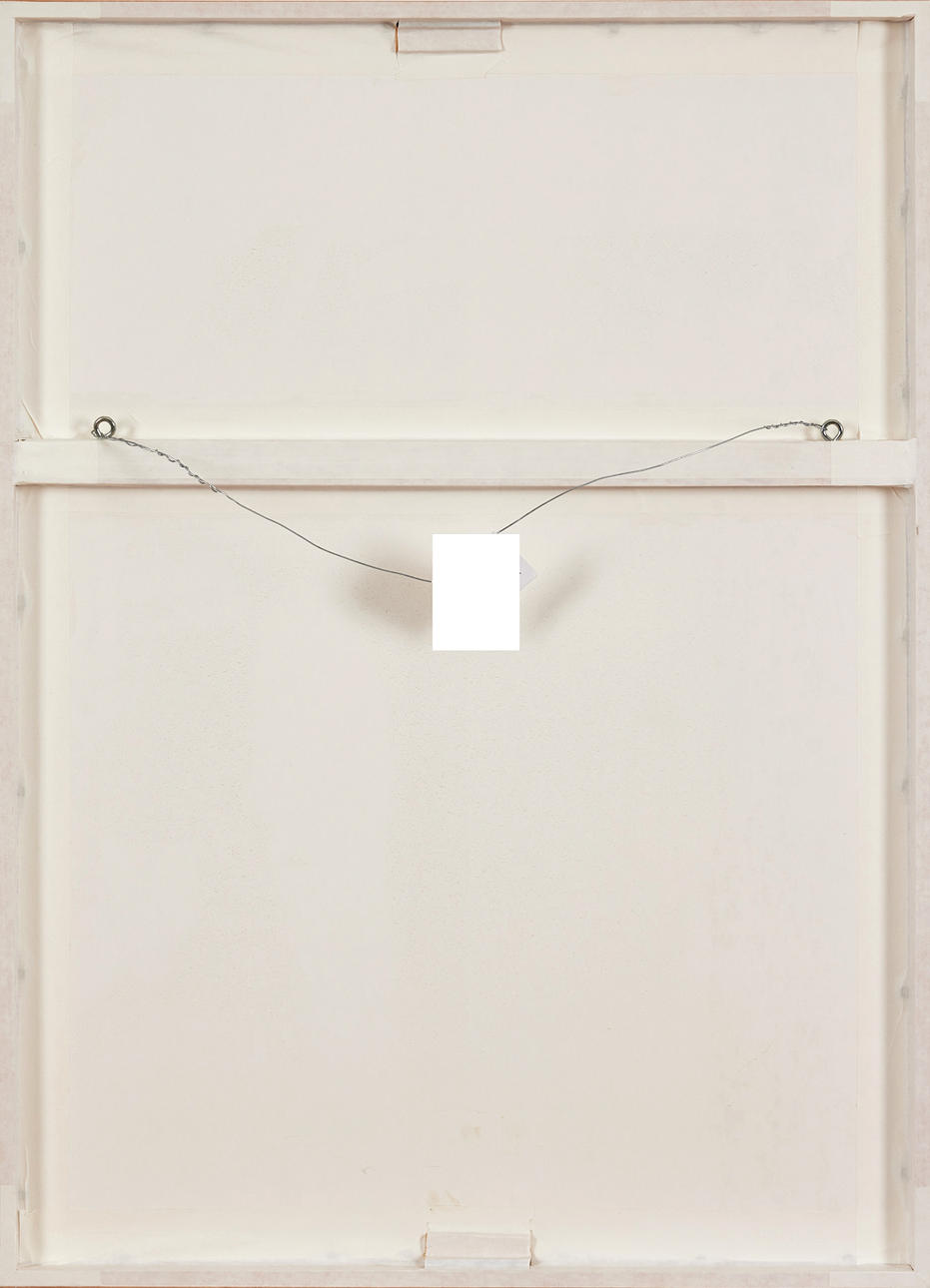674. DAVID HOCKNEY. “The beginning” (watch: Illustrations for Fourteen Poems from C. P. Cavafy”).
This auction is closed, but maybe you like the following items?
Description
Etching and aquatint, 1966. Signed in pencil and numbered 57/75. Printed by Maurice Payne and Black, Alecta Studio, London. Published by Edition Alecta, London.
Plate: 34.6 x 22.3 cm
LITERATURE:
Scottish Arts Council 55.
OTHER:
Illustrations for Fourteen Poems from C.P. Cavafy,, a. He had made earlier references to the writings of the pre-war Greek poet Constantine P. Cavafy. Mirror, Mirror on the Wall, 1961, contains a quotation from the last two lines of the poem 'The Mirror in the Hall', and A Grand Procession of Dignitaries in the Semi-Egyptian Style, 1961, was inspired by the poem 'Waiting for the Barbarians'. But this was Hockney's first major statement inspired by the poet. Although he originally intended to illustrate a far more ambitious range of poems, this proved impractical and he therefore decided only to include those on the subject of homosexual love. A new translation was produced by the poets Stephen Spender and Nikos Stangos, and published with the etchings in 1967.
In early 1966 Hockney went to Beirut, which he saw as the contemporary equivalent of Cavafy's Alexandria, to research imagery for the prints. While taking inspiration from Cavafy's poetry, Hockney also drew upon his own experiences and environment. For instance, his ink drawing Boys in Bed, Beirut (1966) (in fact drawn in London using two of his friends as models) was adapted for one of the prints, According to Prescriptions of Ancient Magicians. Photographs were also used as reference material, especially for such prints as In an Old Book and The Beginning, and the portraits of Cavafy - images he describes as 'very possessed'. Hockney was not entirely pleased with the results, however: 'Things like weight and volume are very hard to get from a photograph. You don't get the information you need to be able to do the line.
Hockney conceived the images, like the English texts, as an updated translation of Cavafy's imagery. Portrait of Cavafy II depicts the poet in front of an architectural setting copied from a drawing Hockney made of a Beirut police station, with a modern car in the foreground. Ja (He Enquired After the Quality, The Shop Window of a Tobacco Store) depict a particular place or scene as described in the poems. Hockney did not work with the poems on his side, nor did he intend each image to be an illustration of a particular poem. Há a Stangos. Intended as visual equivalents to the mood and theme of all Cavafy's homoerotic poetry, Hockney's etchings depict variations on the theme of two men engaged in endless, anonymous pick-ups. Zadnji teme se v Hockney a Cavafy: fleeting experiences, a nostalgia for the erotic, a desire to be deeply involved in the lives of others while remaining a detached spectator.
(Excerpt from the text by Terry Riggs, Tate Modern, 1997).
Condition
Not examined out of frame.
If you have any questions, please, contact lisa.mejeritcher@auktionsverket.se.
Resale right
Artist/designer
Sale
Do you have something similar to sell? Get your items valued free of charge!
Bidding
Description
Etching and aquatint, 1966. Signed in pencil and numbered 57/75. Printed by Maurice Payne and Black, Alecta Studio, London. Published by Edition Alecta, London.
Plate: 34.6 x 22.3 cm
LITERATURE:
Scottish Arts Council 55.
OTHER:
Illustrations for Fourteen Poems from C.P. Cavafy,, a. He had made earlier references to the writings of the pre-war Greek poet Constantine P. Cavafy. Mirror, Mirror on the Wall, 1961, contains a quotation from the last two lines of the poem 'The Mirror in the Hall', and A Grand Procession of Dignitaries in the Semi-Egyptian Style, 1961, was inspired by the poem 'Waiting for the Barbarians'. But this was Hockney's first major statement inspired by the poet. Although he originally intended to illustrate a far more ambitious range of poems, this proved impractical and he therefore decided only to include those on the subject of homosexual love. A new translation was produced by the poets Stephen Spender and Nikos Stangos, and published with the etchings in 1967.
In early 1966 Hockney went to Beirut, which he saw as the contemporary equivalent of Cavafy's Alexandria, to research imagery for the prints. While taking inspiration from Cavafy's poetry, Hockney also drew upon his own experiences and environment. For instance, his ink drawing Boys in Bed, Beirut (1966) (in fact drawn in London using two of his friends as models) was adapted for one of the prints, According to Prescriptions of Ancient Magicians. Photographs were also used as reference material, especially for such prints as In an Old Book and The Beginning, and the portraits of Cavafy - images he describes as 'very possessed'. Hockney was not entirely pleased with the results, however: 'Things like weight and volume are very hard to get from a photograph. You don't get the information you need to be able to do the line.
Hockney conceived the images, like the English texts, as an updated translation of Cavafy's imagery. Portrait of Cavafy II depicts the poet in front of an architectural setting copied from a drawing Hockney made of a Beirut police station, with a modern car in the foreground. Ja (He Enquired After the Quality, The Shop Window of a Tobacco Store) depict a particular place or scene as described in the poems. Hockney did not work with the poems on his side, nor did he intend each image to be an illustration of a particular poem. Há a Stangos. Intended as visual equivalents to the mood and theme of all Cavafy's homoerotic poetry, Hockney's etchings depict variations on the theme of two men engaged in endless, anonymous pick-ups. Zadnji teme se v Hockney a Cavafy: fleeting experiences, a nostalgia for the erotic, a desire to be deeply involved in the lives of others while remaining a detached spectator.
(Excerpt from the text by Terry Riggs, Tate Modern, 1997).
Condition
Not examined out of frame.
If you have any questions, please, contact lisa.mejeritcher@auktionsverket.se.
Resale right
Artist/designer
Sale
Do you have something similar to sell? Get your items valued free of charge!
Details
- Catalogue no
- 674











